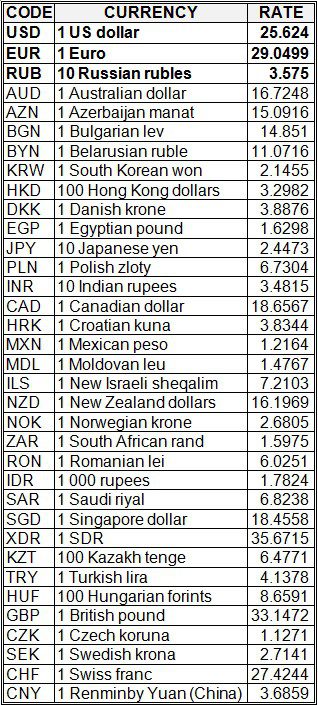
The sale of wood without electronic centralized records will be considered illegal from April 2020 and will be subject to additional checks by law enforcement authorities, Head of the State Forest Resources Agency Andriy Zablotsky has said. “95% of all wood logged by forestry enterprises in Ukraine is subject to electronically record-keeping. With dry figures, this means that 526 permanent forest users are connected to the electronic centralized records, of which 341 are state-owned enterprises, organizations and institutions, 144 are municipal enterprises and 41 are forest users who belong to other organizational and legal forms of management,” he wrote on his Facebook page.
According to Zablotsky, the remaining 5% are individual municipal and private enterprises that are in the process of training and connecting to the electronic centralized records. He reminded that previously only forestry enterprises managed by the State Forest Resources Agency worked in the electronic record-keeping system.
The head of the State Forest Resources Agency said that access to the unified public system of electronic record-keeping of wood was provided to the Ministry of Internal Affairs, the National Police, the State Fiscal Service, the Security Service of Ukraine and other public bodies so that they had the opportunity to verify the legality of wood transportation. The public can verify the legality of logging through the Forest in a Smartphone system and the legality of its transportation by tag number, consignment notes and the vehicle, he said.
“Starting in April, the sale of wood without electronic records will be considered unlawful and will be subject to additional checks by law enforcement agencies,” Zablotsky said.
The State Forest Resources Agency is also preparing amendments to the legislation regarding the criminalization of trade in illegally logged wood and the inaccuracy of information entered into the electronically record-keeping system.
In addition, according to the head of the State Forest Resources Agency, it is planned to resolve the issue of full certification of wood products, so that there are no legislative gaps when individual wood products are exported from Ukraine without certificates of origin.
“Often there are questions both from trading partners and from society that such products are made from wood of dubious origin,” Zablotsky said.
National bank of Ukraine’s official rates as of 12/03/20

Source: National Bank of Ukraine

The Ukrainian industrial company Interpipe has designed, developed and tested a new connection Intrepid-SP, devised specially for the North American market.
According to the company’s press release, this product serves for the construction of directional and horizontal wells in order to extract shale oil and gas which are in hard-to-reach layers – shales, dense sandstones and limestones. Due to the “shale revolution” and new drilling technologies the United States doubled its oil production over the past decade.
At the same time, the purpose of Intrepid-SP is to maintain the column gas tightness under a complex load and ensure its safe rotation during descent. Such rotation is a necessary technological condition for the construction of horizontal sections of wells with large deviations from the vertical.
Intrepid-SP may also be used for the exploitation of traditional deposits but with hard-to-recover reserves, for example, in multilateral wells with horizontal endings or a new horizontal section is “added” to the main well of an existing well.
Interpipe CFO Denys Morozov said that to expand the line of threaded connections for oil and gas production entering new market segments.
“The new connection was developed considering the peculiarities of the North American market and is intended for companies that develop complex deposits. Intrepid-SP was tested in an independent laboratory. We are going to deliver the first shipment by the end of the year,” the top manager said.

Ukrainian Airlines SkyUp (Kyiv) has changed the flight program to Italy and Israel amid spreading of the coronavirus (COVID-9) epidemic, the press service of the company said.
“In view of spreading of the COVID-19 as well as toughening of the measures to limit it to the different countries, in particular Italy and Israel, SkyUp Airlines is reducing its flight program to these countries,” reads the statement.
In some areas, the start of the flight program is postponed to the beginning of summer, and in some areas the number of flights will be cut.
According to the airlines, on the route Lviv – Tel Aviv flights with a departure on March 19, 26, 30, April 2, 6, 13 will be canceled. Flights on the Zaporozhzhia – Tel Aviv route with a departure on March 15, 22 and 29, April 5 and 12 will also be canceled.
In addition, the flight program on the Kharkiv-Tel Aviv route, the start of which was scheduled for March 29, is completely canceled.
Besides, SkyUp postponed the start of flights from Kyiv to Rome, Bergamo, Bologna and Pisa – on June 1, 2020; from Kyiv to Bari – on May 1; from Lviv to Rome and Bergamo – on June 1.
At the same time, flights to Naples will continue unchanged.
The start of flights to Rimini and Lamezia Terme, scheduled for May 30, as well as to Catania (early May 26), remains unchanged.
The airlines also noted that tickets for canceled flights could be exchanged free of charge for other dates or receive a full refund. In case of flight cancellation, the airline will provide a free date change or a full refund of the ticket price.
If a passenger wishes to cancel the trip to Israel for personal reasons, SkyUp will provide a free date change.
Passengers who have purchased tickets for flights Kharkov – Tel Aviv – Kharkiv will be offered a free change of the place of departure / arrival to Zaporizhia instead of Kharkiv or a full refund of the cost of the ticket.
Earlier, on the evening of March 12, Israel imposed restrictions on foreigners arriving in the country. Entry will be permitted only to those who confirm the ability to provide 14-day home quarantine.
Since March 10, Italy due to a sharp outbreak of coronavirus incidence, has imposed a ban on public gatherings, canceled sporting events, and banned movement inside the country without good reason.

The U.S. Department of Agriculture (USDA) in March raised its forecast for the export of major oilseeds from Ukraine in the 2019/2020 marketing year (MY, September-August) by 460,000 million tonnes compared to the forecast in February, to 5.51 million tonnes. According to a March report released on the USDA’s website, the forecast for rapeseeds export was increased by 200,000 tonnes to 3 million tonnes, soybean exports by 310,000 tonnes to 2.45 million tonnes.
At the same time, the U.S. Department of Agriculture lowered its forecast for oilseeds processing by 200,000 tonnes to 17.42 million tonnes, meal exports by 110,000 tonnes to 5.77 million tonnes, and vegetable oil exports by 60,000 tonnes, to 6.6 million tonnes.
The USDA forecasts that in the 2019/2020 MY exports of sunflower oil from Ukraine will be at the level of 6.2 million tonnes, sunflower meal at 4.9 million tonnes, sunflower at 60,000 tonnes.
In addition, the U.S. Department of Agriculture predicts a sunflower crop in Ukraine at 16 million tonnes, production of sunflower meal at 6.5 million tonnes, sunflower oil at 6.78 million tonnes.

Ukrainian young designers, engineers and scientists, together with colleagues from Belgium and Finland, will be able to present their projects at the Dutch Design Week, a key European event for design and innovation. At the exhibition in Eindhoven, which will be held this year from 17 to 25 October, the top three developments from each country will be presented for expert consideration.
The project European Design Upgrade (EDU) aims to develop the creative industries and support talented designers, artists and technologists. Its goal is to find innovative urban solutions for creating a modern and harmonious socio-cultural environment in Ukraine. The project is being implemented under a European Comission-funded Creative Europe program, and implemented by the Vasyl Khmelnytsky fund K.Fund, a GoLocal non-governmental organization and partner country companies — Brussels Creative from Belgium and Urban Mill from Finland.
“It’s a great honour for us to partner with an important European educational project. We hope that cooperation with the EU will open the door to new initiatives aimed at increasingly integrating Ukraine into the international cultural space and enabling talented Ukrainians to contribute to Europe’s development,” Vasyl Khmelnytsky, entrepreneur and founder of the K.Fund, said.
“Creativity is a property of every human being. Creative processes and methods are essential to all societies. But creative people, especially artists, make too often their living by selling their time slots or artefacts as freelancers. Many creative communities are still searching for sustainable business models that enable to scale up outcomes of their creativity. We in Finland are grateful for getting the opportunity to start a process with Ukraine and Belgium to jointly find a solution to this challenge,” Kari Mikkelä, executive producer and co-founder of the Urban Mill Innovation Platform, said.
“We will have to demonstrate that Collective and Connected Intelligence can work cross-border. Interdisciplinary and multicultural ecosystems will collaborate to empower and accelerate their local projects, and the best in class will have the opportunity to showcase their product or service at the Dutch Design Week in Eindhoven. Proud and glad having the Brussels Region connected with Regions of Kyiv and Espoo!,” Alain Heureux, co-founder of Brussels Creative acting as Cluster of the creative economy, said.
Implementation of the project will begin in March 2020 with a selection for a specialized educational course “European Design Upgrade: Transnational Capacity Building”. Participation in it will be free of charge 35 Ukrainian designers and artists, creative specialists in technical, engineering, scientific and entrepreneurial fields, as well as teachers of higher educational institutions of art and design.
The selection for the program during March and April will be carried out by international and Ukrainian experts and mentors. Among them, in particular, the CEO of Brussels Creative, trainer and partner of Virtuology-Academy (Brussels) Alain Heureux and executive producer of Urban Mill, a public-private service for cooperation and creation of innovations and the ecosystem of a smart city (Smart Urban Innovations & Ecosystems, Helsinki) Kari Mikkelä. The lecture course provides six days of masterclasses from leading designers in Ukraine, Belgium and Finland throughout May 2020.
By the next stage — the Design Lab, which will last from June to August 2020, will pass ten participants to whom the program experts will put practical tasks and help form cross-functional teams from the specialists necessary for the chosen direction (artists, marketers, technologists, engineers and etc.) and will provide technical support for the implementation of creative development or ideas that are consistent with existing municipal, regional or national problems
The three best creative ideas from Ukraine, together with Belgian and Finnish similar projects, will be presented at the Dutch Design Week in October 2020.
You can learn more about the project and apply for participation at the following link.
ADDITIONAL INFORMATION
Fund K.Fund was founded by Ukrainian entrepreneur Vasyl Khmelnytsky in 2015 to support projects in the field of education and economics. The mission of K.Fund is to provide keys for development and implementation, to provide opportunities for acquiring new knowledge and skills, to promote discoveries and help to reach a new level.